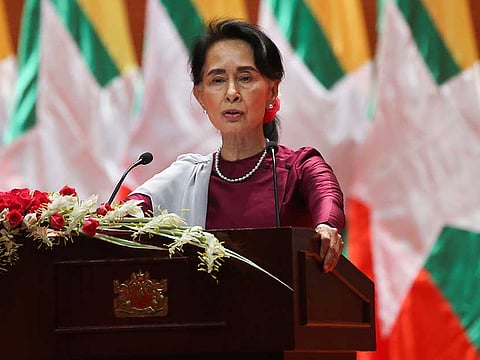Rohingya ethnic cleansing: A painful reminder of the Palestinian tragedy
Suu Kyi’s inaction will encourage states like Israel, and its most extreme government to escalate persecution against the Palestinians

At last the United Nations head has spoken and sent out a warning to the Nobel laureate and Myanmar’s de facto leader, Aung San Suu Kyi, to halt her army offensive that has forced hundreds of thousands of the Muslim Rohingya minority to flee to neighbouring Bangladesh. However, it is better late than never. The UN Secretary-General, Antonio Guterres, warned the Myanmarese leader that she has “a last chance” to stop what was being considered by the UN as a genocide against the Muslim population in the heavily Buddhist populated northern Myanmar state of Rakhine.
“Unless she acted now”, he told the BBC World News on September 18, “the tragedy will be absolutely horrible”. Guterres’ warning came after Bangladesh declared its toughest restriction against more than 400,000 Rohingya refugees who have been forcibly displaced from Myanmar in the last three weeks. Over many decades of persecution, almost 900,000 Rohingya have so far fled to southern Bangladesh and other surrounding countries, following similar vicious acts of ethnic cleansing in the country.
Rohingya, stateless Indo-Aryan race in Rakhine state, are now subject to real genocide. Before the 2015 Rohingya refugee crisis and the Myanmar military crackdown in 2016 and 2017 with the full knowledge of Suu Kyi, the Rohingya population in Myanmar was around 1.3 million residing chiefly in the Rakhine, almost 90 per cent of the entire population of the northern state. Additionally, more than 100,000 Rohingya in Myanmar are strictly confined in camps for internally displaced persons.
What’s happening in Myanmar is in many ways a painful reminder of what’s been unfolding in Palestine over seven decades. Huge mass evacuation and displacement of hundreds of thousands of Palestinians and expropriation of their land since the creation of Israel in 1948. Both peoples, Rohingya and Palestinians, have been repeatedly persecuted, displaced and denied citizenship.
Rohingya majority are Muslim while a minority are Hindu. Described by a 2013 UN report as one of the most persecuted minorities in the world, the Rohingya are officially denied citizenship under the 1982 ‘Burmese Citizenship Law’. This law effectively denies the Rohingya the right of acquiring a nationality. According to the Human Rights Watch (HRW), the Myanmarese law does not recognise the ethnic minority as one of the country’s national races even though history traces the Rohingya back to the arrival of Islam in the 8th century in South East Asia.
Rohingya are also face restrictions regarding freedom of movement, state education and civil service jobs. They have been subjected to military crackdowns repeatedly in 1978, 1991-1992, 2012, 2015 and 2016-2017, with no effective protest from the world community till now. The UN is now officially describing Myanmar’s persecution of the Rohingya as ‘ethnic cleansing’, and the UN special investigator on Myanmar, Yanghee Lee, believes this persecution would eventually lead to the expulsion of the entire Rohingya population from the country. Myanmar’s government refuses to recognise the term ‘Rohingya’ and refers to them instead as Bengalis. HRW is now comparing the conditions faced by the Rohingya in Myanmar with ‘apartheid’.
Based on the information available to many human rights organisations, Myanmar seeks to establish a religiously homogenous Buddhist population in Rakhine, and hence the brutality against its Muslim Rohingya with the aim of driving them out of the country. The reports are horrific: unknown thousands have been killed, entire families burned alive, villages set on fire, children as young as five beheaded, women raped and borderlands deliberately booby-trapped with landmines as tens of thousands of civilian innocent people try to escape to the safe territories of Bangladesh.
According to a damning study by the International State Crime Initiative (ISCI) at the Queen Mary University of London, the Muslim Rohingya community of Myanmar “has been systematically persecuted and expunged from the national narrative — often at the behest of powerful extremist groups from the country’s majority Buddhist population and even government authorities — to the point where complete extermination is a possibility”.
Denunciations have started to pour in, though too late, accusing the Buddhist majority and Myanmar’s government of committing genocide. ISCI report concludes that after decades of oppression, “the Rohingya have reached the final stages of genocide”. The report borrowed the genocide expert Daniel Feierstein’s framework of the six stages of genocide as outlined in his book Genocide as Social Practice, to examine event in Myanmar.
Based on interviews, media reports and government documents, the report established how the Rohingya have undergone the first four stages: stigmatisation and dehumanisation; harassment, violence and terror; isolation and segregation; systematic weakening and are on the verge of ‘mass annihilation’. The sixth stage that involves the “removal of the victim group from collective history”, is already underway in Myanmar according to the report.
Rohingya are the only group of the country’s 135 officially recognised ethnicities that have been targeted by the Myanmarese Buddhist majority, the military junta and government. They have undergone decades of discrimination and deprivation, but now they are on the verge of total cleansing. The country’s de facto leader and Nobel laureate, is saying almost nothing. She had even cancelled her scheduled slot to address the UN General Assembly to avoid criticism. Suu Kyi is certainly neglecting her moral responsibility as a former human rights leader, to say the least. If she gets away with it, as many believe she will, her inaction would only encourage states such as Israel, and its most extreme government to escalate persecution against the Palestinians.
Mustapha Karkouti is a columnist and former president of the Foreign Press Association, London. You can follow him on Twitter at @mustaphatache
Sign up for the Daily Briefing
Get the latest news and updates straight to your inbox



